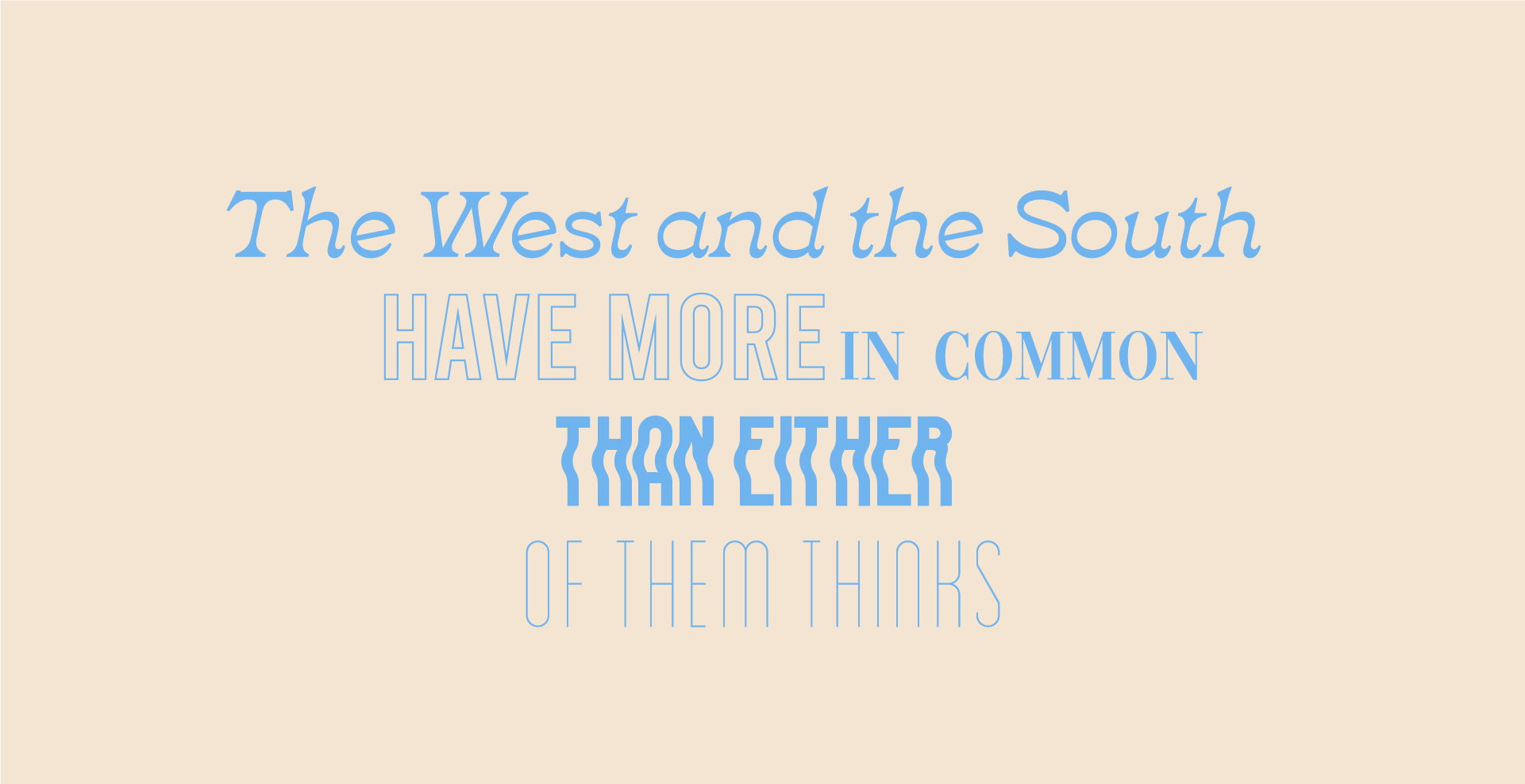
By Brigit Rollins
“You’re moving where? Why would you want to do that?”
“I got a good job offer doing exactly what I want to be doing with a great starting salary.”
“You know you’re gonna get murdered by hill billies, right?”
Before moving to Fayetteville, I lost count of the number of times I had this conversation. It wasn’t the Fayetteville part they objected to – most of the people expressing concern over what they felt was an imminent risk of violence by hillfolk had never heard of Fayetteville – but my move to the state of Arkansas. Or rather, my move to the South in general; the good people of California and Oregon who made up the tapestry of my life prior to August 2019 were at best flummoxed and at worst horrified by my decision to move south of the Mason-Dixon.
It isn’t exactly a secret that people Out West believe certain stereotypes about Southerners. As someone raised an hour north of San Francisco, I’m extremely familiar with anti-South propaganda. Southerners are homophobic, racist, sexist, and uneducated. Particularly in comparison to the democratic West Coast, Southerners are backwards—violently stuck about 170 years in the past. Therefore, to my Californian and Oregonian friends and family, the South was somewhere to escape from, not to move to.
And of the Southern states to escape, none was higher on the list than Arkansas, if they knew anything about the state at all. Unlike nearly every other Southern state, Arkansas does not have a stubbornly blue city that West Coasters can point to as “safe.” Their knowledge of Little Rock begins and ends with the Little Rock Nine. So while a move to Austin, Nashville, or Savannah would have been met with some amount of confusion, it still would have been acceptable. Can’t flip Texas blue or keep Austin weird without sending in some Californians every now and then.
As someone who has lived both 30 minutes from the Pacific Ocean and 30 minutes from the Buffalo River, I can tell you that West Coast assumptions about the West Coast are just as flawed as their assumptions about Arkansas. Californians like to forget that their state is both the home of the Castro District – one of the first gay neighborhoods in the United States – and the home of Ronald Regan. The Proud Boys might have members in Southern states, but they were founded in Vancouver, Washington right across the Columbia River from Portland, Oregon. And though it’s true I’ve seen more Confederate flags since moving to Arkansas than I ever saw in California or Oregon, that doesn’t negate the fact that a boy I went to elementary school with had a large Confederate flag hung in his bedroom, or that the Portland Police Association used to partner with the Klu Klux Klan.
Just as the West Coast is more diverse than stereotypes portray, so too is the South. Demographics show that the South is home to a large population of queer people, of working-class people, of people of color, and, of course, some of the nation’s largest Black communities. Both the civil rights movement of the 1960s, and various worker’s rights movements from the nineteenth and twentieth centuries have their roots in Southern soil.
Since moving to Fayetteville, I have yet to be murdered by someone wearing denim overalls, or been asked to politely explain why I oppose the Confederacy (something my dad was sure I would have to do upon arrival). What I have done, is met a variety of thoughtful and interesting people who have graciously welcomed me into their community.
In the two years that I’ve lived in Fayetteville, I have met artists and musicians working to care for and cultivate local DIY spaces. I’ve met queer organizers who have hosted a trans march and the yearly local Pride parade. I’ve met folks involved in mutual aid groups focused on delivering food and helping people get access to abortion. And I’ve met the very best kind of people – the kind of people you can get a drink with, talk about anything under the sun, and not worry about how loud you laugh. In other words, I’ve met real friends.
The common denominator of all the people I’ve met in Fayetteville is that they are full of love for the place that they live. And though that’s not something unique to any particular locality, as a trepidatious newcomer, meeting people who clearly love their town and the people who live in it helped me to fall in love with Fayetteville too.
Fayetteville, as it turned out, also isn’t really all that different from places I’ve lived out West. People who learn about my move almost always make a comment about how much of a “culture shock” it must have been for me. To which I always reply that the biggest difference I’ve seen is that you’re allowed to smoke inside of some bars in Fayetteville. Not only is smoking indoors illegal in most places on the West Coast, but you’re also liable to get a smug lecture on lung disease from someone who drives a Prius. But otherwise, Fayetteville is a town just like any other with boutique coffee shops, graffiti on the overpasses, and the kind of folks who have the exact right disposition to argue over goats during a city council meeting. What’s not to love about a place so absolutely human?
But no place is ever perfect, and as much as the good things about Fayetteville remind me of the good things about places out West, the same is true about the bad things about Fayetteville. What’s worse is that the bad things about Fayetteville are similar to the bad things out West in a way I had naively hoped they wouldn’t be. Growing up an hour north of San Francisco, I was aware at a young age that spending my life there wouldn’t be an option. Not because I was filled with a desire to spread my wings and see what else was out there, but because it would be nearly impossible for me to ever afford to buy a house in my home county. Between the wine industry and the tech industry, Northern California has been transformed into a place centered around pushing out locals. Every fancy new restaurant, every remodeled tasting room, every expensive new development—all of them were a reminder that my days in my home were numbered, and that these places were not designed for me. And while they came with a thin veneer of “helping the community” or “improving the area,” there’s no denial that these so-called improvements weren’t actually made for the benefit of the people already living there. They were being made for the people who thought that $700k was a reasonable price for a two-bedroom home.

Billboard in Seattle, WA attempting to lure West-coast tech workers to Northwest Arkansas. Northwest Arkansas Council, 2021, Axios.
It’s an unsettling thing to know that the construction going on around you is for the purpose of getting you to leave. It’s a feeling I grew up with, and one I was quickly able to recognize after moving to Fayetteville. It’s probably something that people who have been living in Fayetteville far longer than I have are familiar with as well: The cold feeling in the pit of your stomach when the old house down the road gets knocked down, and three shiny new townhouses go up lighting fast and yardless in its place. Or the sense of foreboding when you hear the city approved another slew of mountain bike trails, or an arts walkway that happens to run right through a houseless encampment. It begs the question, just who are these things for? And if they’re not for those of us already living here, what will be left for us?
Since moving to Fayetteville in 2019, I have not been back to either California or Oregon. I have not had the chance to face the people who warned me against heading south, but I have had the chance to think about what I might say to them. I could spook them with exaggerated stories of rural living, or lambast them for being so horribly “un-woke” as to assume that the South was full of nothing but bigots. Or I could tell them the truth: That Fayetteville has been good to me. That it has been a place where I’ve grown in all the ways a person could possibly want. That it is a kind, welcoming place that I genuinely enjoy living. And that it is a place teetering on the edge of being unlivable for the communities I’ve become a part of. That it really isn’t so very different from my home town, or San Francisco, or Portland, no matter how much I wish it was.
Brigit Rollins grew up in Northern California before living in Portland, Oregon and eventually coming to Fayetteville. She spends her spare time sewing, knitting, and being bossed around by her three cats
